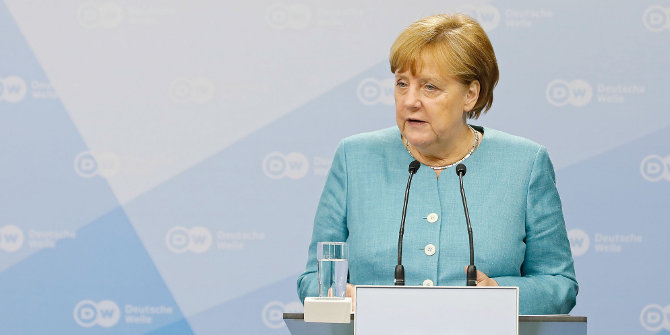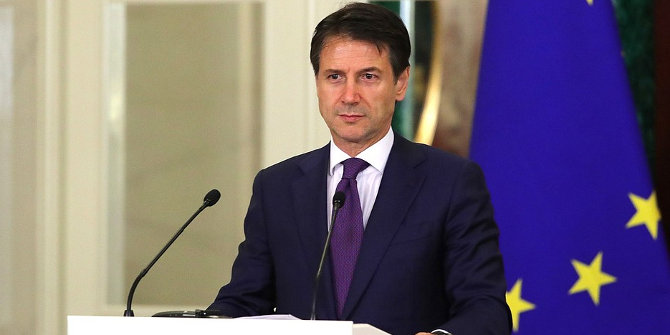Are we seeing a green backlash in European politics? In an interview with EUROPP’s editor Stuart Brown, Liam Beiser-McGrath discusses recent trends in environmental politics and how policy design can shape public support for tackling climate change.
Liam Beiser-McGrath will be speaking at an LSE event on 15 June titled What is driving the green backlash in European urban politics? as part of the LSE Festival 2024.
Five years ago, there was talk of a green wave sweeping over European politics after the success of green parties at the 2019 European Parliament elections. The picture now looks quite different following the 2024 European elections. What’s changed since 2019 with respect to how the public view efforts to tackle climate change?
While climate change is still an important issue, it is now clearly only one of many issues that voters consider to be important. Inflation, energy prices and the Russian invasion of Ukraine still loom large in many voters’ minds, and this confluence of issues make it difficult for climate to be pivotal for voters. In the UK for example, my own research finds that COVID-19 led to a deprioritisation of climate change amongst individuals.
One other point is to strike a note of caution as to what these high levels of concern about climate change and its importance as an issue mean in terms of meaningful progress towards net-zero and the success of green parties. While you do see high levels of support in terms of doing “something” about climate change, once you start to get into the details of what stringent climate policy actually entails (in terms of its costs and not just its benefits), these figures start to drop quite precipitously. As a general comment, given the cost of living crises happening still for many in Europe, this already puts a bit of a dampener on enthusiasm for getting behind green parties full force.
Additionally, as this reality of what meaningful climate policy looks like becomes more apparent to voters in many countries (see the rolled back boiler ban in Germany for example), they may be looking for climate policy that is ambitious, but not too ambitious. This may also be because most of the traditional major parties have adopted climate change as a serious issue to some degree, which means that while green parties have “issue ownership” in terms of a full-speed ahead green transition (that may appeal to a small segment of the public), people can feel broadly content getting some climate action from voting for these more traditional parties (climate-light).
We generally think of cities as being more progressive than rural areas when it comes to environmental politics, yet we’ve seen in recent election results, notably the Uxbridge and Ruislip by-election last year, that anti-green campaigning can have some success in cities. What do you think is driving this phenomenon?
Generally, if you take the main climate policies and identify who is potentially facing rising costs from these policy interventions, then most of the time these will often be people raising opposition to them.
Traditionally, rural areas are more vulnerable to price increases related to energy and transportation (e.g. fuel prices) so that’s where you see a “backlash”. There is also a coupling going on presently with regards to farmers protests (more related to environmental regulation) as part of a broader discontent with what’s considered mainstream policy consensus.
In contrast, if you live in an urban area with good public transport and biking infrastructure, with the lower energy bills you have in modern apartments, it’s much easier for one to live a lifestyle “compatible” with making meaningful progress with climate change and thus more likely for people to vote for green parties. Of course, people living in such areas also often differ in a number of ways. They tend to be more affluent, educated and have progressive ideologies in general, so we can’t say this is “causing” their vote, but it is part of the bundle of factors that tends to lead to green party success.
Those urban areas where we have seen push back tend to be those which are more suburban, where public transport infrastructure is less dense or efficient, and car usage is more prevalent. So policies such as London’s Ultra Low Emission Zone impose clear costs to individuals in these situations, where the ability to switch to public transport is less straightforward than more dense urban areas.
You’ve carried out a lot of research on the political feasibility of climate action. In broad terms, how can we better design policies to increase public support for tackling climate change?
This research mostly focuses on identifying: 1) how the costs of climate policy generate political backlash and shape public support and 2) how policy design changes the cost-benefit calculations to overcome potential resistance.
Take for example the hardest case: introducing a carbon tax. While economists love them as a means of making the polluter pay, there have been consistent political challenges from the streets (the Gilets Jaunes) to the ballot box (failed ballot initiatives in the United States, such as in Washington in 2018).
Here, the key is to not just think about the tax as incentivising people to reduce carbon emissions but also that the revenues generated can build a consensus behind climate policy. This revenue recycling is effective in increasing support for carbon taxation generally and depending on the design actually building a majority behind a carbon tax in some instances.
Important, however, is that this revenue recycling clearly benefits individuals directly (e.g. through tax rebates or “carbon dividends”) or funds investment in renewables. If it is used for more diffuse purposes, such as reducing the government deficit, then citizens aren’t willing to get behind the tax.
Additionally, political trust and communication are also key in moving this forward. If citizens don’t believe or don’t know about the benefits that they will receive in clear terms, then they’ll be unlikely to get behind policies as envisioned. Therefore, we have to design policies that reflect not just the environmental but also the political reality in order to make meaningful changes to climate policy.
What role does economic inequality play in the willingness of citizens to support climate policies?
Inequality plays two key roles in building support for climate policy. First, economic inequality often relates to issues of fairness, that are important for policy support. Take for example efforts to increase the price of using polluting goods and services (e.g. cars and airplanes). In a high inequality environment, these can be considered unfair as there is a perception that the rich can buy their way out of doing their fair share, leading to a collapse in support behind taking action. So, finding a way to overcome that, again say through redistribution is important.
Second, it turns out that information about the impacts upon inequality and the redistributive potential of climate policy can shape policy initiatives. For example, some of my research on carbon taxation examined cross-national differences in responses to redistributive policy designs. German respondents, particularly those with higher incomes, displayed a greater receptiveness to redistributive aspects of carbon tax policies. In contrast, high-income Americans, including Democrats who typically advocate for environmental policies, showed decreased support for carbon taxation when confronted with its personal financial implications.
Additionally, in other reserch I find that information about the distribution of household CO2 emissions by income significantly changes individuals’ support for carbon taxation. In that case, you see low-income individuals becoming much more supportive of carbon taxation, while high-income individuals significantly decrease support.
All told, understanding inequality really is fundamental to both the cause of climate change but also policy responses. Navigating this balance in terms of who pays the costs and who receives the benefits, is therefore crucial for getting sufficient political backing for a meaningful green transition.
What is driving the green backlash in European urban politics? will take place on 15 June from 12-1pm as part of the LSE Festival 2024.
Note: This article gives the views of the interviewee, not the position of EUROPP – European Politics and Policy or the London School of Economics. Featured image credit: Alexandros Michailidis / Shutterstock.com






